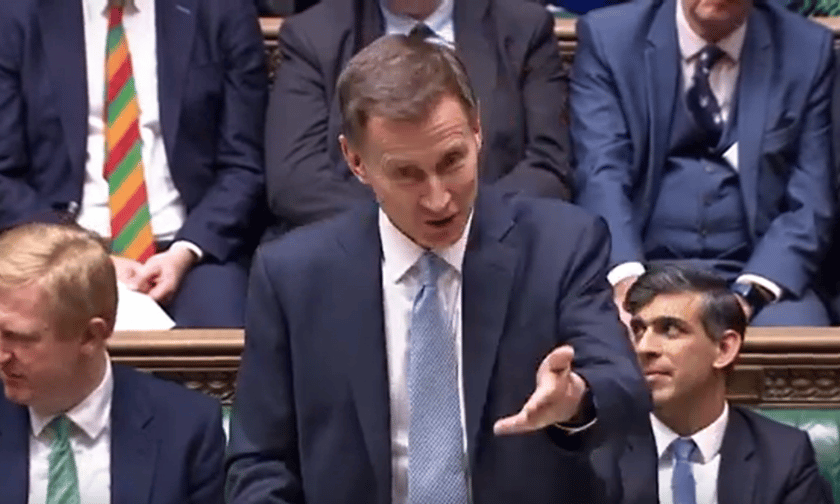

Image credit: Screengrab from Spring Budget 2024 streamed by HM Treasury
UK Chancellor Jeremy Hunt (pictured above) delivered the Spring Budget 2024 on Wednesday, and the likes of BIBA (British Insurance Brokers’ Association) and CII (Chartered Insurance Institute) have been quick to react.
For BIBA, the Budget was a combination of welcome interventions and missed opportunities.
BIBA chief executive Graeme Trudgill commented in a statement sent to Insurance Business: “With the cost of living continuing to bite, we welcome the positive measures to ease the burden on businesses and working people announced in the Budget. However, we also recognise the missed opportunity when it comes to taking more decisive action on issues such as Insurance Premium Tax, and increased flood investment in response to inflationary pressures.
“Managing risk and ensuring economic security by closing protection gaps and building business resilience are and should be the priority of all political parties. Therefore, BIBA will continue to champion these and wider issues on behalf of our members as we move further into this election this year.”
The Association of British Insurers (ABI), meanwhile, expressed full support in the areas of investment and savings.
“We fully support the Chancellor’s focus on encouraging greater investment in the UK, economic growth, and putting savers at the heart of decisions,” ABI director general Hannah Gurga said.
“The insurance and long-term savings industry has a crucial role to play in this, and our Investment Delivery Forum is the driving force behind ensuring the £100 billion unleashed from Solvency UK can be invested in green and good projects. We’re delighted to be working with Government to finalise a framework for the Mansion House Compact, which aims to increase investment in unlisted equities by 2030.”
Also on hand to provide insights was Dr Matthew Connell, director of policy and public affairs at the CII.
In an emailed statement, Connell declared: “Right at the beginning of his speech, the Chancellor set out his fundamental aim – for a ‘high wage, high skill economy’. Professional bodies are at the forefront of this, bringing together employers and employees, creating relevant qualifications that are recognised across entire sectors, increasing job mobility and career security, and creating communities that support continuing development.
“The Chancellor highlighted the world-leading status of the UK’s financial sector – it is a living example of a high skill, high value sector. We welcome the Chancellor’s decision to bolster resilience by increasing the repayment period for a loan for household emergencies from 12 to 24 months, and an end to a £90 charge for debt relief orders…
“We welcome the increase in ISA tax allowances – with an extra £5,000 for investment in UK investments – however, the ISA system has been popular because it is much simpler to understand than pensions – it would be better to have one ISA limit, and for British investments to prove their worth in a competitive market.”
Offering a different perspective, Institute of Economic Affairs executive director Tom Clougherty asserted that Wednesday’s Budget has not really moved us any closer to where we need to be. In Clougherty’s view, while the tax cuts will provide some relief, they “ultimately won’t do much to revive the stagnating economy” that is the root of most of the country’s problems.
“This Budget didn’t really address the UK’s long-term fiscal challenges, particularly around the impact of an ageing population,” he said. “On the other hand, it did highlight the absurdity of setting tax policy based on highly variable five-year debt forecasts. Fiscal rules should be a good thing, but the way we’re using them makes no sense at all.
“There’s no getting away from the fact that raising living standards in the long run depends on generating faster economic growth. And that means prioritising tax reforms with genuine pro-growth impact, fixing our broken planning system so that we can build more of everything, and accepting that we need to couple spending restraint with major reforms to public services.”
David Williams, head of group risk at Towergate Health & Protection, was not entirely happy with the Budget as well.
“The Spring Budget feels like a missed opportunity for the government to recognise the enormous power of employee benefits in both reducing sickness and helping to improve the UK economy – both of which are key focus areas for the government,” Williams noted in an emailed comment.
“The investment in the NHS to modernise IT equipment and improve their efficiency is welcome, but that was the only real nod towards support in the healthcare space. The Autumn Budget in November 2023 teased us with the ‘Back to Work’ plan to support sick or disabled adults back into work along with a launch of the occupational health consultation. But the Budget hasn’t built on this, and that’s a missed opportunity.
He went on to highlight: “There was opportunity to expand to a wider view of employer-led interventions which go far beyond occupational health services. Employers with well-structured wellbeing programmes see reduced absence rates – often preventing absence from occurring in the first place – and more productive workforces.
“It would have been great to see measures announced in the Spring Budget which encouraged or incentivised businesses to support their employees in these areas. By building on their ‘Back to Work’ plan in this way, the government could have taken great strides to reduce the UK sickness rates and boost the economic activity at the same time.”
What do you think about this story? Share your thoughts in the comments below.
